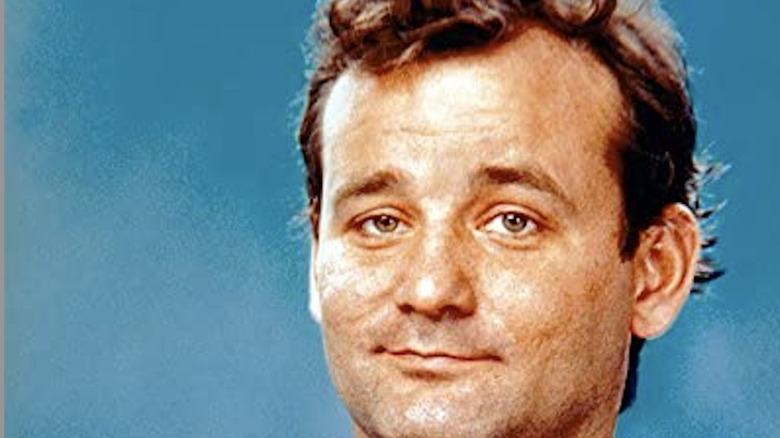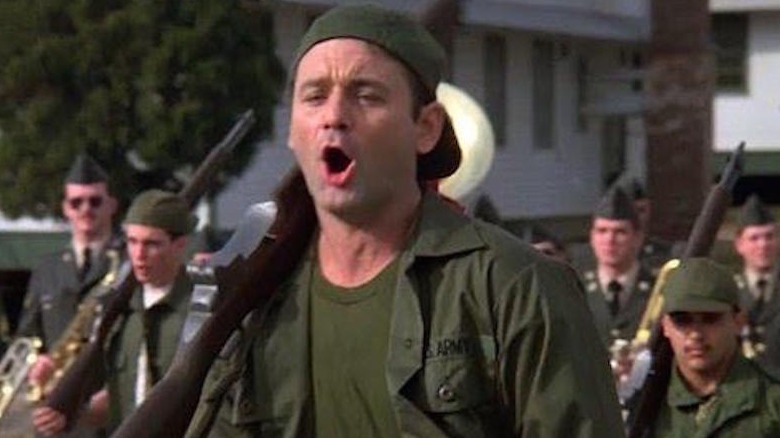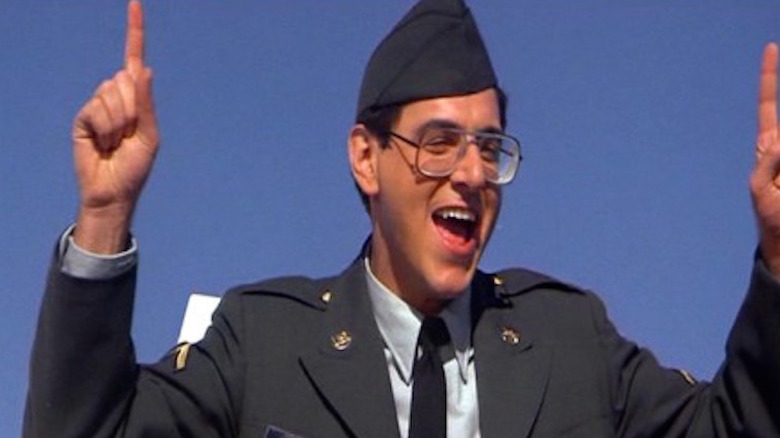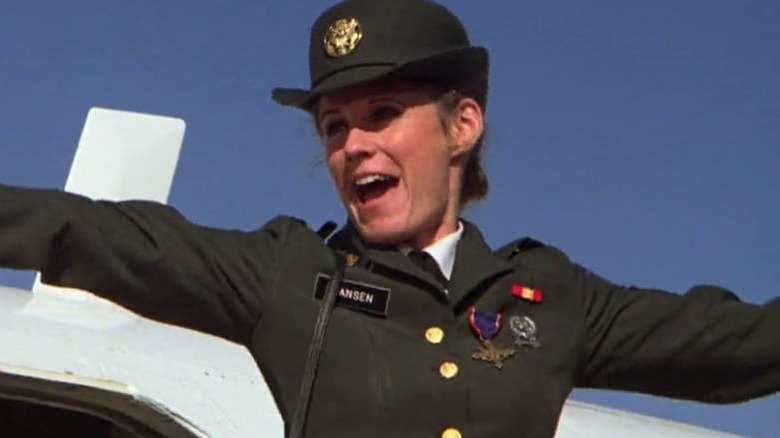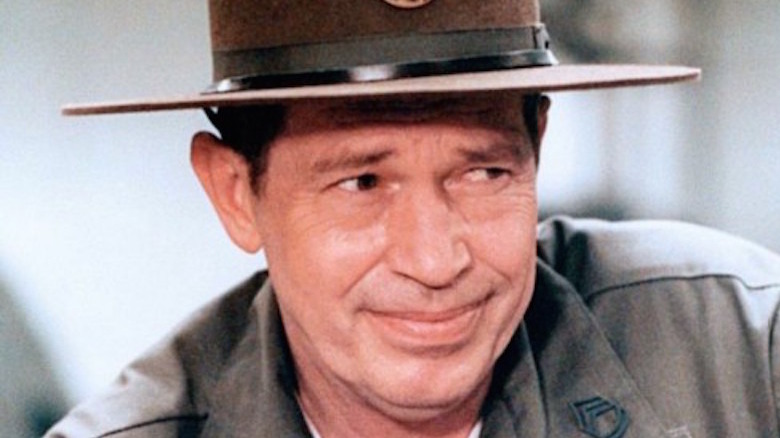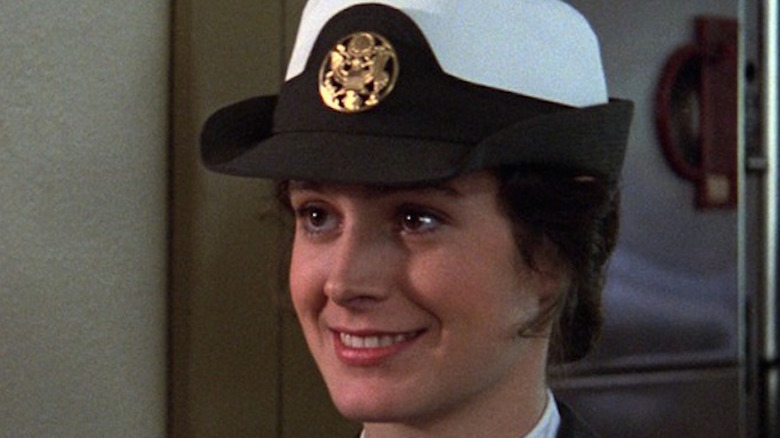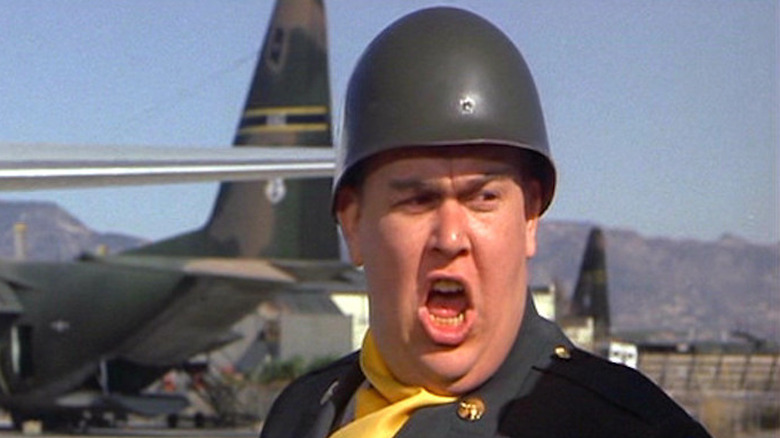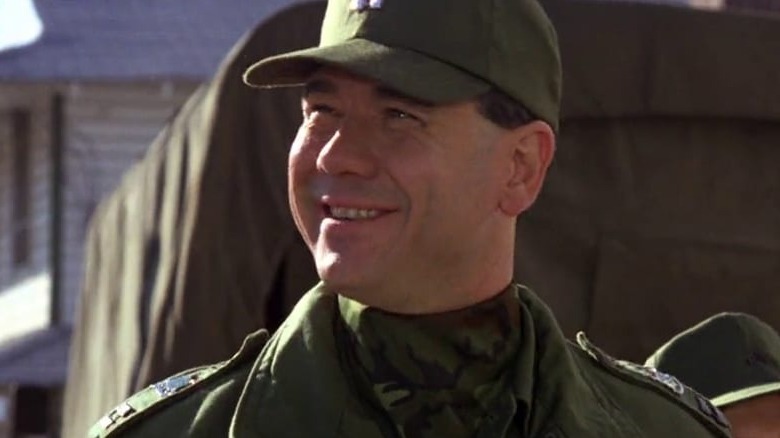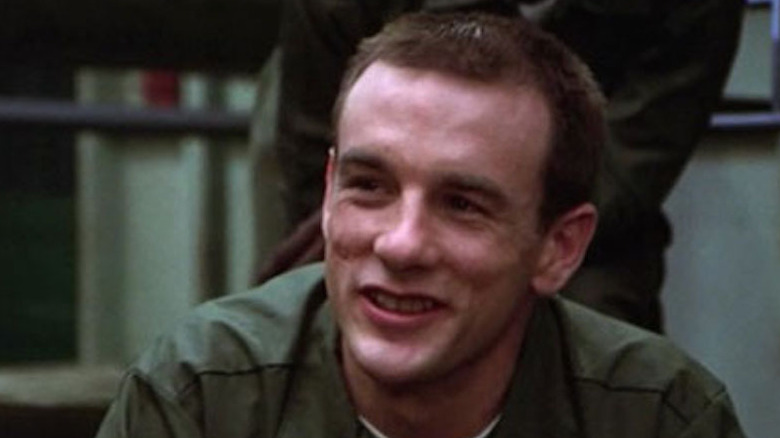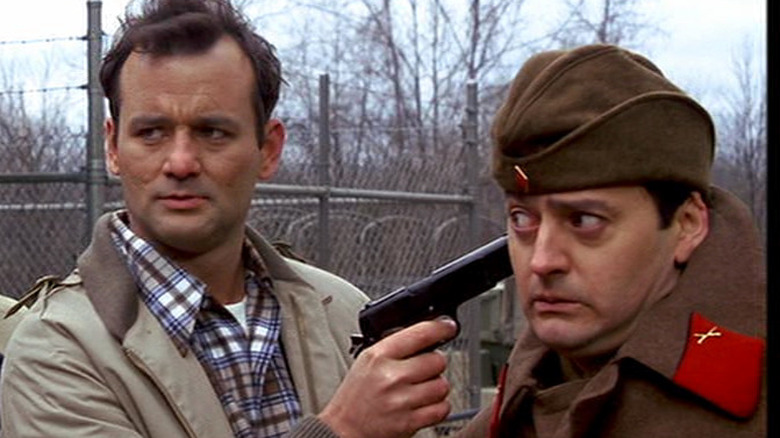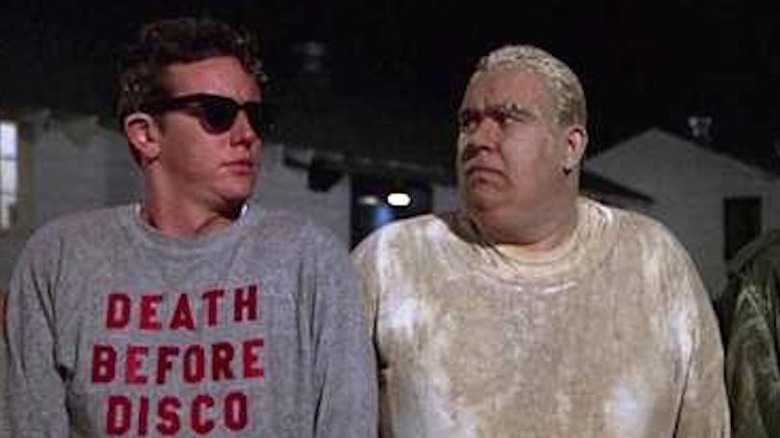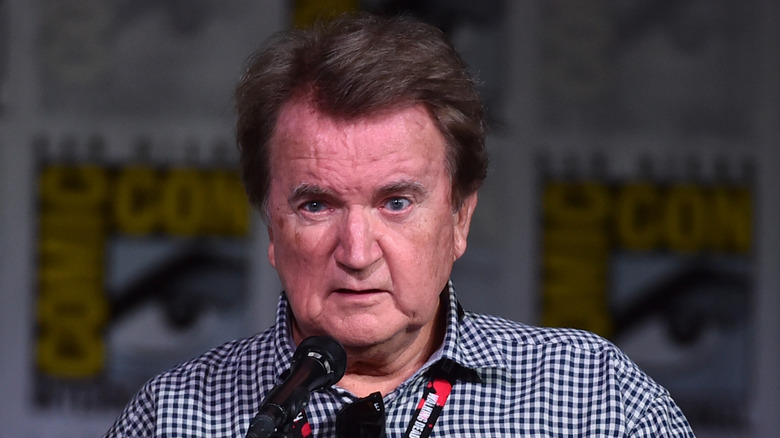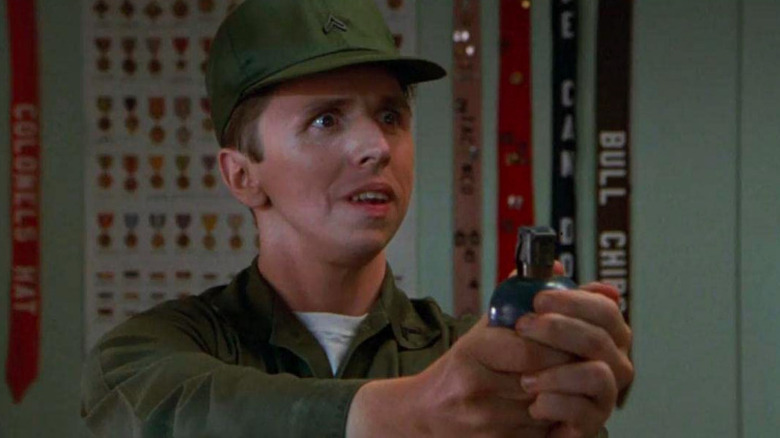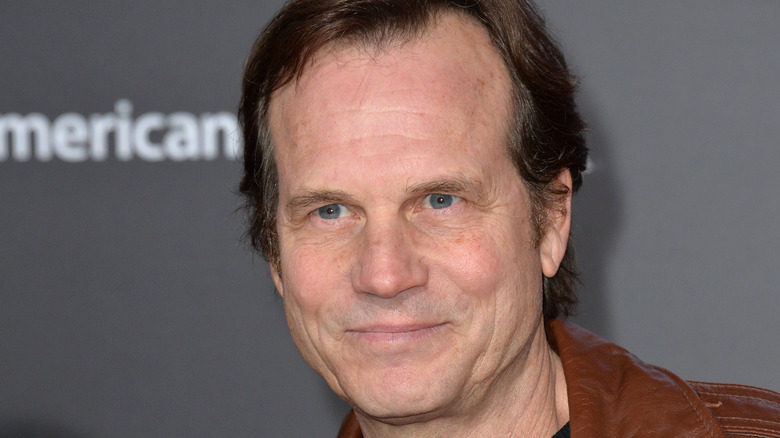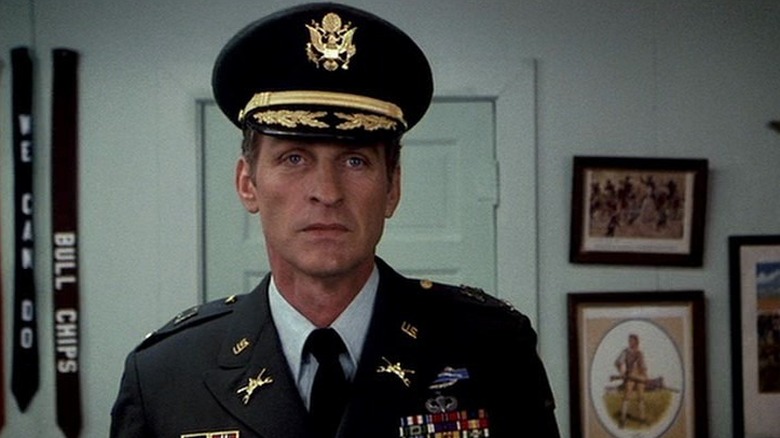Whatever Happened To The Cast Of Stripes?
Ivan Reitman's 1981 comedy "Stripes," which helped transform Bill Murray into a box office star, was initially intended as a vehicle for Cheech and Chong. In a 2021 interview with the U.S. Army that coincided with the 40th anniversary of the film's release, director/co-producer Ivan Reitman ("Ghostbusters") said he conceived the idea before the premiere of "Meatballs" in 1979, pitching it to screenwriters Dan Goldberg and Len Blum. The counterculture comedy duo liked the idea, but abandoned the project after failing to secure creative control. This led to Reitman contacting his "Meatballs" star, Bill Murray, and another collaborator, Harold Ramis — who had co-written "Animal House," which Reitman co-produced — to play two ambition-challenged friends who join the Army and become unlikely national heroes.
Much of the success of "Stripes" is due to the comic interplay between Murray and Ramis, as well as a supporting cast of Canadian comic talent and first-time U.S. actors. The film's solid box-office take helped many of those players springboard into their own screen careers, with several become bona fide stars in their own right. Here is a look at the stars of "Stripes," and the careers they've enjoyed in its wake.
Bill Murray has had a unique career since Stripes
Bill Murray had already transitioned from one of the brightest talents on "Saturday Night Live" to bona fide movie star with "Meatballs" and "Caddyshack" before he was cast as Louisville cab driver and world-class wiseguy John Winger in "Stripes." The success of the film — it was the fifth highest grossing release in North America in 1981 — marked the beginning of a long, offbeat, endearing acting career.
That career has followed a unique arc over the past four decades: Murray appeared in box office blockbusters like "Ghostbusters" and "Groundhog Day," both with "Stripes" co-star Harold Ramis, as well as "Charlie's Angels," "Zombieland," and numerous others. He has also established himself as a dramatic actor and character player through numerous collaborations with Wes Anderson on films like "Rushmore" and "The Life Aquatic with Steve Zissou" (he has appeared in every Anderson film except "Bottle Rocket"), as well as Sofia Coppola's "Lost in Translation, George Clooney's "Monuments Men," and Jim Jarmusch's "The Dead Don't Die."
Now in his seventh decade, Murray appears content to pick and choose projects that strike his fancy: He's a mainstay in indies like Anderson's "The French Dispatch" and Coppola's "On the Rocks," but is also breaking his long-standing distance from the "Ghostbusters" franchise by reprising Peter Venkman in "Ghostbusters: Afterlife." Recently, he suggested — in true, off-the-cuff Bill Murray fashion — that he has filmed an undisclosed role in "Ant-Man and the Wasp: Quantumania." With an Oscar nomination, two Emmys, a Golden Globe, and two Independent Spirit Awards, Bill Murray can continue his eccentric path as long as he wants.
Harold Ramis was a reluctant actor
Harold Ramis had three hit films to his name (writing "National Lampoon's Animal House" and "Meatballs," writing and directing "Caddyshack") and considerable comedy cred as a Second City alumnus and a writer/performer on "SCTV" when he was approached with the script for "Stripes." Ramis rewrote the script but felt unsure about playing Winger's sidekick, Russell Ziskey. As Ramis told GQ in 2009, Columbia Pictures was less than thrilled about a largely unknown actor in the role, but as actress P.J. Soles (who played MP Stella Hansen) noted in an A.V. Club interview, Murray would not do the film without Ramis as his on-screen partner.
The decision proved wise: "Stripes" was a major hit, and Ramis enjoyed a long and successful career as not only a writer and director, but also occasional actor on some of the most popular and successful comedies of the '80s and 1990s, including "Ghostbusters," "Groundhog Day," "Back to School," "Analyze This," and "Multiplicity." In 2010, Ramis was diagnosed with autoimmune inflammatory vasculitis, which contributed to a decline in his health and eventual death at the age of 69 on February 24, 2014. Murray and Ramis, who had not spoken for more than two decades after a falling-out during the making of "Groundhog Day," reconciled shortly before his death.
PJ. Soles became a cult favorite
Actress P.J. Soles had already appeared in several hit movies prior to joining the cast of "Stripes." She was, of course, memorably offed by Sissy Spacek in Brian De Palma's "Carrie" and by Nick Castle's Michael Myers in "Halloween," and enjoyed a stellar showcase for her high energy as Riff Randall in Allan Arkush's "Rock 'n' Roll High School." Her turn in "Stripes" as Winger's romantic interest, MP officer Stella Hansen, came on the heels of her appearance in another military comedy, "Private Benjamin," with Goldie Hawn.
Soles followed "Stripes" with "Sweet Dreams," the biopic of country singer Patsy Cline, in 1985, before settling into character parts in indie features. She returned to studio features with 1999's "Jawbreaker," but remained a staple of independent projects for most of the 2000s. These included Rob Zombie's "The Devil's Rejects," which cast her as a victim of the Firefly family. Her connection with "Halloween" earned Soles a minor roles as a teacher in David Gordon Green's 2018 remake of John Carpenter's film.
Legendary character actor Warren Oates played tough Sgt. Hulka
Though "Stripes" is overflowing with comic talent, one of its funniest and most memorable lines is delivered by Warren Oates, a veteran character actor best known for hard-bitten dramatic roles in films like "The Wild Bunch." Oates, who plays Fort Arnold drill instructor Sgt. Hulka, was known for his unshowy and believable performances, and his introduction in "Stripes" is no exception.
After listening patiently to a psychotic rant about killing anyone who touches him or his belongings, Oates drawls, "Lighten up, Francis" — Psycho's real name — with a weariness and reserve that tells you everything about his character. Hulka's heard similar speeches by dumb recruits like Psycho for years, and the best response is to shut down that noise quickly, firmly, and decisively.
Oates, who had been in features and on television from the early '60s (he's in memorable episodes of "The Outer Limits" and "The Twilight Zone"), moved from character roles to leads in gritty films like Monte Hellman's "Two-Lane Blacktop" and "Bring Me the Head of Alfredo Garcia" by maverick director Sam Peckinpah. Those indelible films made him a go-to for younger directors like Reitman and Steven Spielberg, who cast Oates in "1941" one year before "Stripes."
The success of "Stripes" earned Oates excellent notices, but he would not live to enjoy the acclaim. The 52-year-old actor died of chronic obstructive pulmonary disease in 1982, not long after completing John Badham's "Blue Thunder."
Sean Young followed Stripes with Blade Runner and Dune
Another actor to enjoy a boost in stardom after appearing in "Stripes" was Sean Young. The Kentucky native had just one credit — the 1980 drama "Jane Austen in Manhattan" — before landing the role of MP Louise Cooper, who becomes Russell's love interest in the film. Young followed the success of "Stripes" with a string of critical and box office favorites like "Wall Street" and "No Way Out," as well as a pair of notorious flops — "Blade Runner" and David Lynch's "Dune" — which have gone on to enjoy cult status.
However, Young's ascent was cut short by a series of alleged on-set clashes with directors like Oliver Stone on "Wall Street" and James Woods on the drama "The Boost." Young reportedly earned a reputation for being difficult, which in an interview with the Daily Beast, she claimed cost her the role of Tess Trueheart in "Dick Tracy" and Catwoman in "Batman Returns," a role she pursued with in-costume appearances on TV talk shows.
Personal issues, including a bout with alcoholism, pushed Young further out of the mainstream, and by the 1990s and 2000s, she was working largely in independent features, save for a supporting turn in "Ace Ventura: Pet Detective." However, television has offered steady work, including a run on "The Young and the Restless" in 2010 and "The Alienist" in 2018.
John Candy's Hollywood career took off after Stripes
Harold Ramis recruited a number of fellow Second City and "SCTV" co-stars to fill out the cast of "Stripes," including Dave Thomas, Joe Flaherty — and, in the role of amiable if easily excited recruit Dewey "Ox" Oxburger, actor/writer John Candy. Prior to "Stripes," Candy had been in numerous Canadian television series and the occasional feature, but rose to prominence as a member of Toronto's Second City and "SCTV." Bit roles in American features like "1941" and "The Blues Brothers" preceded his casting in "Stripes."
Candy's performance — equal parts vulnerable ("I swallow a lot of aggression — along with a lot of pizzas!") and berserk (the mud wrestling scene) — charmed audiences and led to a string of lead and supporting roles in a number of well-loved Hollywood films, including "Splash," "Spaceballs," "Planes, Trains and Automobiles," "Uncle Buck," and "JFK." While filming the Western comedy "Wagons East!" in Mexico, Candy died of a heart attack at the age of 43.
John Larroquette improvised one of the movie's funniest lines
As the inept Captain Stillman, who oversees Winger and Russell's platoon in "Stripes," actor John Larroquette improvised one of the film's most enduring lines of dialogue: while spying on the women's shower, Stillman utters, "I wish I was a loofah." In a 2008 interview with the AV Club, Larroquette said that after three decades as a professional actor, fans still repeat the line upon meeting him.
Larroquette began his screen career as the narrator of the original "Texas Chain Saw Massacre" in 1973 — a role he repeated for the 2003 remake and 2006 sequel, "Texas Chainsaw Massacre: The Beginning" — before landing minor roles in films like "Altered States" and "Cat People." His breakout role, as self-impressed, woman-hungry prosecutor Dan Fielding, began three years after "Stripes" and netted him four Emmy wins. His success on the series led to occasional feature work, including a reunion with Candy in "Summer Rental," but also extensive TV assignments.
He starred in his own sitcom, "The John Larroquette Show," from 1993 to 1996, and earned a fifth Emmy for his recurring role as the manipulative murderer Joey Heric on "The Practice." Later TV assignments included recurring roles on "Boston Legal," "Chuck," and "The Librarians." Larroquette will reprise his role as Dan Fielding for a 2021 sequel series to "Night Court," with Melissa Rauch as the daughter of Harry Anderson's Judge Stone.
Dependable character actor John Diehl earned his big break with Stripes
Among the many eccentrics populating Winger and Russell's platoon in "Stripes" is "Cruiser," an easy-going recruit who earned his nickname from his car club and an affection for "fast cars and fast women." The military appears to be his idea of a good time, though as Cruiser notes at one point, he joined to avoid being drafted like his father and brother. When Hulka informs him that the draft is over, Cruiser asks, rather blankly, "There was one?"
Like many of his castmates, John Diehl was at the beginning of his film career when was cast in "Stripes." A regular performer on the Los Angeles theater scene in the early '80s, Diehl had a handful of credits, including a minor role in "Escape from New York," before "Stripes," but worked steadily after its release. He reunited with Ramis for "National Lampoon's Vacation" before gaining a major showcase as Detective Larry Zito on "Miami Vice." However, he found the role unfulfilling and asked to be killed off by the producers.
In the 1990s and 2000s, Diehl was a prolific character player in studio and indie features including "The Client," "Stargate," Oliver Stone's "Nixon," "Pearl Harbor," and "Jurassic Park III." TV has kept him busy in recent years with recurring roles on "The Shield," "The West Wing," "Friday Night Lights," and "Snowfall." Small screen viewers may also recognize him as automotive executive Harley Earl in a string of commercials for Buick.
Joe Flaherty is among the Second City greats in Stripes
Joe Flaherty's role is relatively small in "Stripes." He appears in the second half of the film as a hapless guard at the border of Czechoslovakia during an attempt to recover the EM-50 Urban Assault Vehicle. But Flaherty is well-known to comedy fans as both a member of the Second City Theater in Chicago and as a performer on the "National Lampoon" Radio Hour with Murray, Ramis, and John Belushi.
He later co-founded Second City Toronto and co-starred with Ramis, John Candy, Dave Thomas, Catherine O'Hara and Martin Short on "SCTV." Flaherty played such memorable characters as station manager Guy Caballero and TV horror host County Floyd, and earned nine Emmy nominations for writing, winning twice in 1982 and 1983. He also maintained a steady career as a guest performer on television and in features in the 1980s and 1990s, most notably "Used Cars," "One Crazy Summer," and "Back to the Future Part II" as the Western Union man who delivers Doc Brown's 70-year-old letter to Marty McFly.
Flaherty's other memorable turns include playing Lindsay and Sam Weir's perpetually aggravated dad Harold on "Freaks and Geeks," as Dr. Fred Edison on the Nickelodeon show "Maniac Mansion," and as an antagonistic fan in "Happy Gilmore." Now in his eighth decade, Flaherty has maintained a low profile in recent years, though he joined many of his "SCTV" castmates in 2018 for a tribute to the series that was filmed as a Netflix special by Martin Scorsese.
Judge Reinhold became one of the '80s busiest actors
Judge Reinhold made his second screen appearance as Private Elmo Blum in "Stripes." It's a minor role, and best remembered for two elements: the "Death Before Disco" sweatshirt he wears at the mud-wrestling match, and his wealth of pot-related dialogue. As Ivan Reitman told "The New Yorker" in 2021, the latter was left over from the film's previous incarnation as a vehicle for Cheech and Chong.
Reinhold's film career took off in a major way within a few years of "Stripes." Supporting roles in "Fast Times at Ridgemont High" led to his starmaking turn as Detective Billy Rosewood in "Beverly Hills Cop." Reinhold enjoyed leading man status in films like "Ruthless People" and "Vice Versa" before moving into supporting assignments in the 1990s. He has spent much of the last three decades in direct-to-video projects and episodic TV — though on occasion, he's earned the chance to display his comedy chops: he earned an Emmy nomination as the close talker in a 1994 episode of "Seinfeld," and played a courtroom judge — named Judge Reinhold — on episodes of "Arrested Development" and "Clerks: The Animated Series."
Dave Thomas is one of Canada's comedy greats
Joining fellow "SCTV" vets Harold Ramis, John Candy, and Joe Flaherty in the cast of "Stripes" is Dave Thomas, who plays the MC at the mud-wrestling match. It's not much of a showcase, but Thomas had already cemented his comedy talents at Toronto's Second City and on "SCTV," for which he teamed with Rick Moranis to play Bob and Doug McKenzie, while also essaying such memorable characters as the Pacino-esque Cruising Gourmet and the grimacing organ pitchman Tex Boil. He also won a 1981 Emmy for writing on the series.
Shortly after "Stripes," Thomas co-directed the McKenzie Brothers' big-screen adventure, "Strange Brew," and worked at a breathless clip in features and television as writer, actor, and director. As an on-screen performer, his credits included the ABC sitcom "Grace Under Fire," "Weeds," "Comedy Bang Bang" and "Arrested Development" as Charlize Theron's "Uncle Trevor." He's also written and produced for everything from "America's Funniest Home Videos" to "Bones" and "The Blacklist."
Statues of Thomas and Rick Moranis as Bob and Doug were installed at the ICE District Sports Arena in Edmonton, Canada in 2020, the same year that Thomas was appointed to the Order of Canada, which is the country's highest civilian honor.
John Voldstad later earned laughs as Darryl #2 on Newhart
John Voldstad's appearance in "Stripes" as Colonel Stillman's aide was one of dozens of film and TV roles he enjoyed before vaulting to pop culture fame as the silent "other brother Darryl," or Darryl #2, on "Newhart." He made his screen debut in the cult action-crime film "Switchblade Sisters" before moving on to minor roles in "1941" (with Warren Oates, John Candy, and Joe Flaherty) and guest turns on series like "Charlie's Angels." He appeared in "Stripes" one year before "Newhart" began its seven-year run on CBS.
When "Newhart" ran its course in 1990, Voldstad returned to character parts in features and on TV. Again, most were minor appearances, including a shop owner in "Leprechaun," a club patron in "Forrest Gump," and reprisals of Darryl #2 on "Coach" and Bob Newhart's short-lived "George and Leo." He did enjoy a rare lead in the hallucinatory neo-noir "Night Train" in 1997, but since has maintained a low profile.
Look close and you might see Bill Paxton in Stripes
"Stripes" has a large cast of actors on the cusp of stardom, including a few whose presence may be unknown to casual viewers. Dennis Quaid, who was married to P.J. Soles at the time of filming, is credited as an extra in a party scene, and Timothy Busfield plays a soldier with a mortar, but the late, great Bill Paxton also turns up briefly as one of Winger and Russell's fellow recruits. He has no lines in the film, and serves largely as a background player. In a 2017 interview with Yahoo that spanned his entire career, Paxton discussed his brief appearance in the mud-wrestling scene, and his experience working with Bill Murray.
Paxton appeared in "Stripes" at the very beginning of his career, when he was also logging minor roles in horror movies like "Mortuary," the occasional TV show, and one-offs like a Nazi radio operator in Pat Benatar's video for "Shadows of the Night." It was also during this period that he directed, starred in, and single-handedly selected his smelly co-stars for "Fish Heads," an early MTV sensation that went "viral" before it was even a term; Rolling Stone would later pick Paxton's short film for the Barnes and Barnes novelty hit as the 47th best music video of all time. Paxton's tenacity even got the clip a slot on "Saturday Night Live."
His minor turn in James Cameron's "The Terminator" led to a lengthy collaboration with the director which included "Aliens," "True Lies," and "Titanic"; by the 1990s, Paxton had transitioned from character player to supporting and lead roles in "Apollo 13," "A Simple Plan," "Twister," and the TV series "Big Love." His final screen appearances came in the 2017 TV series "Training Day"; Paxton died following open-heart surgery on February 25, 2017 at the age of 61.
Lance LeGault added another tough military role with Stripes
Character actor Lance LeGault put his signature rumbling voice to excellent effect as Colonel Glass, who assigns Winger's platoon to rescue the the EM-50 Urban Assault Vehicle in "Stripes." Glass was one of many hard-as-nails military types LeGault played during his long career, including recurring bad guy Colonel Decker on "The A-Team," and the equally villainous Colonel Greene on "Magnum P.I."
A one-time stunt double for Elvis Presley, LeGault worked at a non-stop pace from the late 1960s to the early 2000s, including recurring roles on "Battlestar Galactica," "Dynasty," "Knight Rider," and "Dallas." Between acting assignments, LeGault also lent his voice to numerous television commercials for Burger King and 7-Up, as well as animated projects, and video games like 1998's "Battlezone II: Combat Commander." His final film role came in the 2013 indie feature "Prince Avalanche," which starred Paul Rudd. LeGault died prior to its release on September 10, 2012 at the age of 77.
